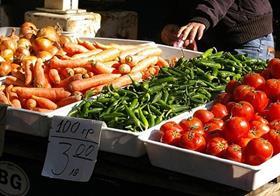
The Bulgarian authorities have launched anextensive and ongoing investigation into the nation’s fruit and vegetablesector, focusing in particular on traders who reportedly avoid paying taxes onfresh produce brought into the country from neighbouring Greece and Macedonia.
In a statement released by the Bulgarian Finance Ministry,it was revealed that Bulgaria’s Deputy Prime Minister and Finance MinisterSimeon Djankov had ordered tax authorities and the police to monitor traders atthe country’s main food markets and at border crossing points for suspectedevasion of Value Added Tax, which is payable on all imported fruit andvegetables.
The country’s borders with Greece and Macedoniahave formed the focus of Mr Djankov’s investigation – he has doubled the numberof officials at each of the borders, instructing them to conductround-the-clock checks of fruit and vegetable imports.
“I am sending two mobile groups to theborder crossing points of Kulata and Zlatarevo,” he explained. “In the groups are representatives of the National Revenue Agency (NAP) and experts fromthe Agriculture Ministry, as well as the customs inspector and borderpolicemen.'
He added: 'We will send experts from NAP to inspect thewholesale markets for any irregularities, because we have information that manyimport companies are in fact phantoms, and that they have presented forgeddocumentation to customs instead of invoices.'
Corruption and crime has been a major talking point inBulgarian society over the past year. In July, the centre-right GERB party waselected into government partly on the back of promises it made to tackle bothareas, which many regard as not only detrimental to the country itself – Bulgariais estimated to be losing between €1bn and €1.6bn a year due to smuggling andtax evasion – but also hampering full integration and acceptance into the EUfold.
Indeed, millions in EU funding that could potentially aid Bulgaria’sdevelopment have been held back by Brussels on the grounds that it has failedto address the corruption issue. Much of this funding is for agriculturalprojects.



